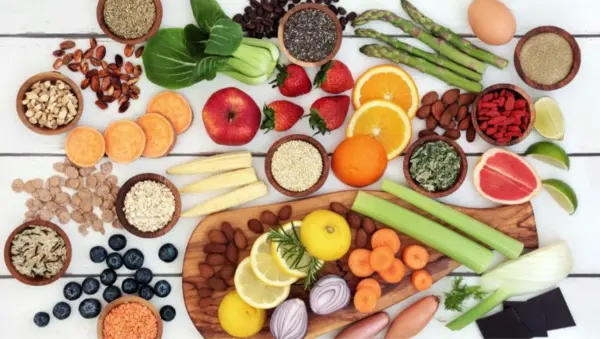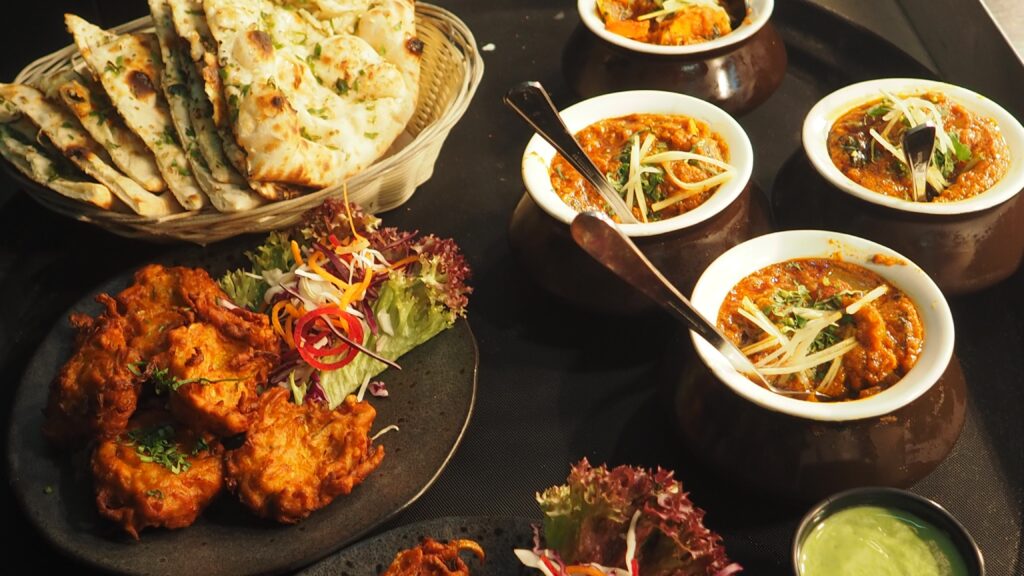Wellhealthorganic.com: Ayurveda-dinner: Ayurveda encourages eating three times a day to keep the digestive system going – Agni – and strong. Fasting and skipping meals can upset the digestive rhythm and cause indigestion.
Eating warm, nourishing foods that encourage the flow of Agni helps to ignite the digestive fire. These meals can include things like Kitchari or light Chai soup.
Ultimate Healing Ayurvedic recipes food– Kitchri
recipes foodi is a staple of Ayurveda cuisine (also known as khichdi) and is presented in a traditional wtraditionallyma, a therapeutic cleansing process takes place to eliminate excessive imbalances in the body. But this unique dish can be eaten at any time of the year to nourish, cleanse, and balance the digestive system.
It is a comforting, nourishing, and cleansing ancient dish for all body types or doshas. In addition to being a powerful detoxifier, it contains nutrients that support healthy digestion and immunity.
Ayurveda is an ancient healing system that has been practiced in India for thousands of years. This ancient practice is an intuitive and healthy way of eating that focuses on a holistic approach to life.
The concept of biometric traits is at the heart of Ayurveda and helps to guide the types of foods, herbs, and spices to best balance the body’s basic constitution or state of health. To find out which foods, spices, and remedies will align with your basic body constitution, take my free Ayurveda body type test today!
Unlike most Western diets, Ayurveda foods are cooked until they are easily digestible. This means that their Agni (digestive fire) has a chance to build up. This is the key to eliminating accumulated toxins from the body.
For this reason, a Kitchari cleanse can be particularly effective, as it restores your digestive system and gives it time to heal. However, if you have a chronic illness or severe digestive problems, always speak to a health professional before embarking on this journey.
To prepare this triple version of kitchari, start with one cup of mung beans (split mung beans) or lentils and one cup of basmati rice. Soak the mung beans and rice in water for at least 1 hour, drain, and rinse well.
Add the soaked rice and mung beans to a large pot with 4 or more cups of water and boil. Once boiling, reduce the heat to low. Cover and simmer for 30 minutes or until the rice is tender and the mung beans are cooked.
Packed with healthy pulses and vegetables, this nutritious one-pot dinner is based on ancient health and tastes great! It’s perfect for people who want to add more vegetable protein to their diet. It’s ideal for people who want to add more vegetable protein to their diet. And it has many health benefits too.
Perfect Food for Spring
Wellhealthorganic.com: Ayurveda-dinner Ayurveda is a holistic health system dedicated to finding balance and harmony between body, mind, and spirit. It also focuses on seasonal eating, according to what grows abundantly at certain times of the year. This approach harmonizes the body and mind with the rhythms of nature, which helps to maintain healthy and sustainable energy and well-being.
Spring is one of the most important times of the year to pay attention to your diet, as it is the time of year. When the earth awakens from its winter hibernation everything around it begins to bloom. It is the perfect time to start getting rid of the excess kapha that has built up over the winter months and can lead to heaviness, lethargy, and colds come spring.
With the arrival of warm weather, Ayurveda doctors recommend eating lighter, more easily digestible foods. These include a variety of fresh seasonal vegetables – such as cauliflower, cabbage, leeks, asparagus, and broccoli – as well as some pulses and cereals.
According to Ayurvedic these lighter foods support digestion (Agni), which in turn supports the immune system and overall health. They are also a rich source of essential vitamins, minerals, and antioxidants. This is key to helping your body fight seasonal illnesses.
In spring, Ayurvedic physicians recommend eating light, simple meals in a regular cycle throughout the day. Ideally, lunch should be the main meal of the day and include lightly cooked cereals, pulses, and vegetables. Minimize evening meals and snacks, ideally avoiding refined and highly processed snacks or foods high in fat or carbohydrates.
Sapna Punjabi Gupta, an Ayurvedic physician, and researcher says turmeric and lemon rice is an ideal dinner dish that can help the body enter the warmer weather thanks to nutrients such as black mustard seeds, raw peanuts, curry leaves, and green chilies. Soaking basmati rice in water for about 15 minutes before cooking will make it easier to digest and enhance the flavor of the dish, he says.
Perfect Food for Winter
Winter is the perfect time to eat nutritious foods that keep you warm and boost your immune system. The ancient science of Ayurveda recommends eating healthy and wholesome foods such as fresh milk, fruits and vegetables, whole grains, ghee (clarified butter), and nutritious tubers to maintain a strong immune system all year round.
The Ayurvedic meals aim to calm the three energies or doshas of nature (pitta, vata, and kapha) when they are out of balance. When they are in balance, the body, mind, and spirit are naturally energized and nourished.
In winter, when it is cold and dry, Wellhealthorganic.com:ayurveda-dinner Ayurveda recommends eating a lot of hot food, as well as food rich in ghee, honey, sesame seeds, sugarcane products, soaked nuts, warm golden milk, khichadi, and chicken broth. These nutritious and easily digestible foods are the best way to balance the immune system during the winter months.
Another important aspect of wellhealthorganic.com: ayurveda-dinner-diet is to include more foods that are rich in spices and antioxidants that boost Agni. These antioxidants save the body from free radicals and reduce oxidative stress.
These antioxidants are found naturally in herbs, fruits, and vegetables .wellhealthorganic.com: Ayurveda-dinner they help strengthen the immune system, improve sleep, reduce inflammation, and prevent cancer. Ayurvedic wisdom also says that digestion is similar to “fire” in the digestive tract. And in winter, nourish your agni by choosing warm foods rich in spices and antioxidants.
So choose foods with sweet, sour, salty, and bitter flavors. These flavors promote toning, hydration, and detoxification and counteract the effects of vata and kapha.
In addition, winter is the perfect time to incorporate agni-supporting oils and fats into the diet. These oils and fats are rich in oleic acid, an essential fatty acid that helps the body maintain a healthy internal temperature.
In addition to food, a well-balanced exercise routine is an important part of the Ayurvedic winter diet. The exercise routine should be designed to calm the Vata dosha and strengthen the Kapha dosha, and it is also important to respond to the body’s signals and adjust diet and exercise habits accordingly.
Perfect Food for Summer

The summer heat can be brutal, damaging your energy levels and making it difficult to sleep soundly at night. And it leaves you feeling bloated and dehydrated. But there are things you can do to balance your body and mind to feel energized and healthy this season.
According to Ayurveda, wellhealthorganic.com: Ayurveda-dinner, the best way to do this is with a diet based on light, refreshing foods. These are foods nature offers
us naturally during the hottest months of the year to help refresh the body and mind. And also to rebalance your constitution (energy).
When it comes to balancing your constitution. One of the most important principles is to understand that each person’s body has its own unique combination of Qi, Water, Fire, and Earth. This makes each person’s dosha unique, and each dosha has its own foods and herbs that it likes or dislikes
Depending on your body type, some foods may be good for you. And other foods may increase your body’s calories and make you feel more tired than before. But the good news is that you can change your diet and herbs. Even your environment can support and nourish your dosha throughout the year.
For example, Ayurvedic physician Sapna Punjabi-Gupta recommends eating more turmeric and lemon rice. Boost your digestive fire during the summer months. This recipe is full of flavor and spice, as well as anti-inflammatory properties that will soothe your tummy and calm your dosha.
Herbal supplements such as kapha tea, savage, Brahmi, and tulsi. Fennel and neem are also excellent to add to the diet during the summer months to help maintain balance. The herbs in these supplements will help you feel grounded. As well as nourishing your dosha with the minerals needed to keep your digestive system active and strong.
Another sustainable herbal supplement is hibiscus, which is an excellent source of vitamin C and antioxidants. Hibiscus is also said to be very cooling, which will ease digestion and reduce bloating.
Final words
Ayurveda believes in eating whole foods. Choose organic products whenever possible to get the most nutrients and antioxidants.
Ayurveda recommends eating moderate amounts of protein and carbohydrates. A good Ayurvedic diet consists of 25-30% protein and 60-70% carbohydrates.
Ayurveda recommends drinking plenty of fluids throughout the day to keep the body hydrated. Try adding herbal teas or water with lemon or ginger for extra flavor.
Ayurveda encourages you to take time for yourself each day. Eat with intention and enjoy every bite. Relax and savor every bite.
FAQ’s
Which foods should avoid during an Ayurvedic dinner?
Ayurveda does not encourage eating curd, grains, or non-vegetarian foods during supper.
What foods should you avoid when having an Ayurvedic dinner?
Ayurveda does not recommend eating curd, wheat, or non-vegetarian meals during dinner.
What is the finest Ayurvedic breakfast food?
Cooked apples, consumed first thing in the early hours, aid in the production of ojas, the final and most purified by-product of digestion.
What are the most difficult Ayurvedic meals to digest?
Red meat, nuts, cheddar cheese, and wheat are hard to digest since they are heavy, thick meals.
